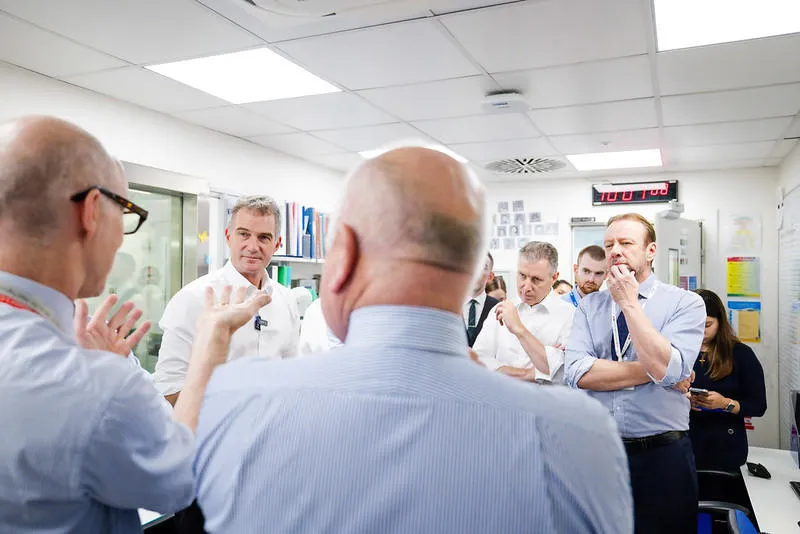We were delighted to welcome the Secretary of State for Health and Social Care,Wes Streeting, and the Secretary of State for Science, Innovation and Technology, Peter Kyle, to the PET Centre. The total-body PET scanner will allow King’s academics to unlock the next medical breakthroughs, improving the lives of people in London, UK and worldwide. This partnership between the NHS, academia and industry is an example of the type of world-class research that we conduct at King’s, and demonstrates our commitment to be in service to society.
Professor Graham Lord, Senior Vice President, Health and Life Sciences
28 November 2024
Secretaries of State for Health and Science unveil new cutting-edge scanner at King's
The Secretary of State for Health and Social Care Wes Streeting MP and the Secretary of State for Science, Innovation and Technology Peter Kyle MP met with King’s researchers to learn about a new total-body PET scanner that could transform drug discovery and diagnose serious illnesses earlier.

The new total-body PET scanner was unveiled by ministers today at the PET Centre in St Thomas’ Hospital. The Minister was met by Professor Graham Lord, Senior Vice President, Health and Life Sciences, Professor Sebastien Ourselin Head of School of Biomedical Engineering and Imaging Sciences, and Professor Alexander Hammers, Head of the PET Centre and Professor of Imaging and Neuroscience.
The visit was hosted by Professor Ian Abbs, Chief Executive, Guy's and St Thomas' NHS Foundation Trust, Professor Dame Ottoline Leyser, Chief Executive, UKRI and Professor Chris Molloy, Chief Executive, Medicines Discovery Catapult.
The new scanner is up to 5 times more sensitive for single organ studies and up to 2-4 times faster than standard PET-CT scanners, meaning quicker diagnoses and a more detailed reading of the patient's whole body. It will also give researchers unparalleled insights into human biology that ultimately leads to better healthcare.
The scanner will feed findings into the new National PET Imaging Platform (NPIP). NPIP, which is operated by the UK’s Medicines Discovery Catapult in partnership with the Medical Research Council and Innovate UK, will build a bank of data from patients across the UK to improve diagnosis and aid researchers’ understanding of diseases, which can support the development of new medicines.
The scanner is managed by King’s and Imperial College London. Researchers from King’s will be using the scanner to gain deeper insight into disease.
Dr Sohaib Nazir, a Clinical Senior Lecturer and Consultant Cardiologist at the School of Biomedical Engineering & Imaging Sciences, will lead a project to understand the impact of heart failure on other organs of the human body such as the lungs, liver, spleen, kidneys and muscle.
Professor Alexander Hammers, Head of the PET Centre, said: “We are very grateful for the funding which has allowed the installation of this cutting-edge scanner. We will continue our successful partnership between the university, King’s, and the hospital, Guy’s and St Thomas’ NHS foundation trust, to run ambitious research programmes that will also directly benefit patients – many of whom we will invite to participate. Total Body PET will let us scan better, faster, with even less radiation, and will open up entirely new possibilites.”
Also at the visit was the first patient to be scanned. Sarah Corfield, who has stage 4 melanoma and has been receiving regular PET scans as a patient at Guy’s and St Thomas’ as part of the diagnosis and treatment for her condition said the new scanner was not claustrophobic, unlike previous scanners, and was quicker.
She added: “I just lay there, like on a sun lounger, thinking of my little dog Maggie. It was very smooth, and much quieter.”
Science and Technology Secretary, Peter Kyle, said: "Cutting-edge scanners like these and the intelligence they provide can help UK patients live longer, healthier lives while easing the pressure on our NHS.
"Ultimately, these kinds of medical advancements will quite literally save lives - through earlier detection, faster diagnoses and more effective treatment in complex illnesses like cancer, dementia and heart disease."
Ensuring our world-leading researchers have access to the most advanced technology is key to them unlocking the next medical breakthroughs, in turn improving the lives of people across the UK and beyond, while also growing our economy.
Science and Technology Secretary, Peter Kyle
Health and Social Care Secretary, Wes Streeting, said: "St Thomas’ Hospital’s new state-of-the-art scanner is an example of the government funded innovative technology we want all patients to have access to for their NHS care.
"This scanner can diagnose conditions quicker and provide more personalised care for patients.
"Through our 10 Year Health Plan we will ensure that the NHS is made fit for the future, shifting the focus from analogue to digital, hospital to community and sickness to prevention, so that we can all receive care that is timely and effective."




